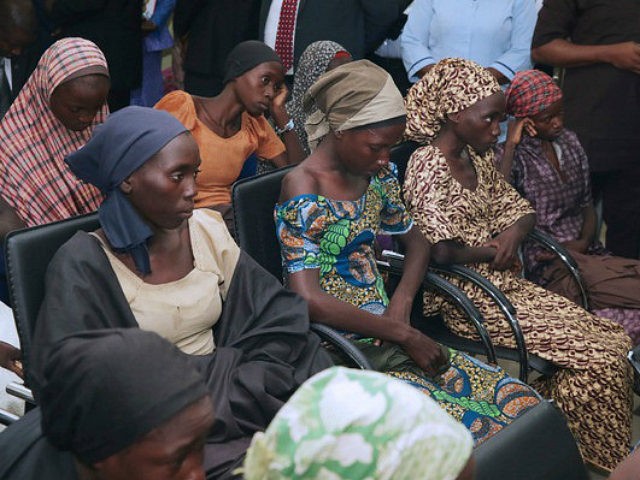The Islamic State-affiliated terrorist group Boko Haram has released 21 schoolgirls abducted from the northern town of Chibok in 2014, the first time any of the girls kidnapped in that particular episode have been released, rather than escaped.
The Nigerian government confirmed the release on Thursday, though they have yet to identify the girls in question. The Nigerian newspaper Vanguard has published photos of some of the girls safely under the auspices of Nigerian authorities, but the photos do not have any names attached. The families in Chibok have told the newspaper they do not know yet if their daughters are part of the release.
“The release of the girls… is the outcome of negotiations between the (Nigerian) administration and the Boko Haram brokered by the International Red Cross and the Swiss government. The negotiations will continue,” a spokesman for President Muhammadu Buhari tweeted.
“The President welcomes the release of the girls but cautioned Nigerians to be mindful of the fact that more than 30,000 fellow citizens were killed via terrorism,” he added, noted that the girls will be “resting” before their custody will transfer to the nation’s vice president.
Boko Haram abducted over 200 girls from the town of Chibok, in northeastern Borno state, in April 2014, as the girls were taking a physics final exam. Dozens escaped in the days following the attack, but after the stream of escapees stopped flowing back to the town, the girls were rarely heard from.
Boko Haram terrorist leader Abubakar Shekau has said in various video statements that the girls were married off to jihadists, forced to convert to Islam (most are Christian), and have since had children and been brainwashed into embracing jihadist murder. Some, he has said, were sold as slaves.
In the past year, Boko Haram released two videos showing Chibok schoolgirls — one dead and one alive. In the first video, a group of the girls, whom parents were able to positively identify as the girls abducted from Chibok, asked for the government to negotiate with Boko Haram. In the second, terrorists pointed at corpses of women they claimed were the Chibok schoolgirls, allegedly killed by Nigerian government airstrikes.
Boko Haram has abducted hundreds of women and children across northeastern Nigeria and continue to operate as a wing of the Islamic State — the Islamic State West Africa Province (ISWAP). They are the deadliest terrorist group in the world.
As Boko Haram often razes villages to the ground and targets markets with suicide bombings, those who escape abduction are also mired in poverty and starvation. The most conservative estimates of the number of civilians in Nigeria who have died of starvation after being cut off from food supplies by Boko Haram activity are in the hundreds.
Over three million people are currently refugees in their own country, however, displaced by Boko Haram and forced out of their villages into refugee camps. Others are refugees in neighboring Chad and Cameroon, though those nations have returned many of these individuals to Nigeria. The situation in these camps is dire.
“About a million and a half of the victims have fled the Islamist extremists and are living in makeshift camps, bombed-out buildings and host communities, receiving minimal supplies from international organizations. An additional 2 million people, according to the United Nations, are still inaccessible because of the Boko Haram fighters, who control their villages or patrol the surrounding areas,” The Washington Post reported this week.
The food and water shortages have forced many women who have escaped Boko Haram but ended up in refugee camps to prostitute themselves in order to eat.
“At times, the food is not enough so the women resort to giving themselves for food and money,” Hassana Pindar of the medical charity International Medical Corps (IMC), which runs support centers for women in the camps, said earlier this month. A recent survey by NOI polls found that 90 percent of Nigerians in refugee camps cannot find enough food to eat a healthy amount on a daily basis.
When Boko Haram abducted the Chibok girls in April 2014, the U.S. government vowed aid, and First Lady Michelle Obama sent out a tweet. The Obama administration, during the tenure of Secretary of State Hillary Clinton, had refused to designate Boko Haram a Foreign Terrorist Organization.

COMMENTS
Please let us know if you're having issues with commenting.